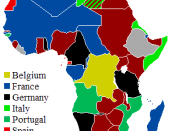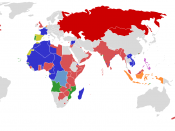History is inherently dominated by men. Women, however, have played major roles in the world as well. Society had always accepted a lifestyle of the man bringing home the money and the woman cooking, cleaning and raising the children. Women's rights movements and feminism started somewhere and that place was Africa during colonialism. Written histories portray women as the calm moderators who try to please everyone. On the other hand, those same writings show men as savage and war-hungry; completely the opposite of women. This is not entirely true because women started their movement for equality when Africa was colonized by Europe. Women had sit-ins and peaceful gatherings as well as violence as in the case of the 1947-48 revolt which goes to prove that the women could be as vicious as men. Whether it was European colonial officials doctoring records or native Africans ignorance of the truth, the content of African history is filled mainly with stories of great men, not women and it was with the women's movement in Africa that showed the world that men and women were equal.
Colonial systems of administration had prolific effects on these women. That did not stop women from uniting in anti-colonialism resistance and make changes in gender and power relations from the colonial period to the present. Women in Nigeria, Senegal and Ghana took major leaps towards fixing the inequities that existed in their countries.
Women were more negatively affected than positively influenced during colonialism in Africa. Adjustments in gender roles and classes were felt the most by females who were compelled to adhere to new gender-based divisions of work in farming, metropolitan, and political regions of the economy. Author Bessie House Soremekun said, "Colonialism affected the status and authority that women had achieved in the pre-colonial era" (107).


